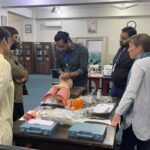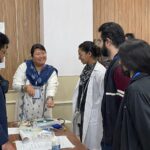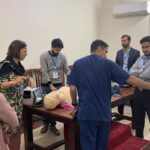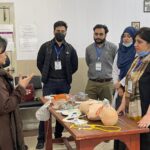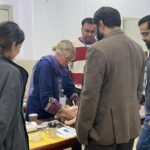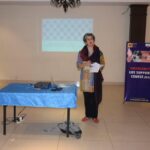The Australian team arrived in Sialkot after three years of their last ELSI course in Pakistan. COVID-19 was the reason for this break in course delivery and so in February 2023, it started again.
The area we are covering this time are Lahore and Sialkot. We choose those areas which lack developed emergency care and providing them with the competence can result in improved care for the citizens of that area. This course is relevant as it was developed in Australia and was designed initially for the far areas of Australia which was resource poor, and access to quality health was an issue. Since access to quality care as well as resource constraints are present in plenty of areas of the world and also in Pakistan, so ELSI was relevant here also. For the past few years we are involved in all sort of training to frontline people whether doctors or nurses and paramedics, we have seen that there are plenty of organizations which carry out provision of basic life support teaching. There are programs running in Pakistan to teach masses, and that’s is a good initiative. There are other programs who cater to developing competence to paramedics and yet there are other programs for the doctors.
Emergency care is a continuum, as it starts from the scene of emergency and ends where the definitive care is rendered usually in the hospital. So it has to be coo-ordinated as well as quality driven. The community has to play its role, and then healthcare staff starting from paramedics on ground to emergency department care by nurses and doctors and then in-patient care by a team of doctors and nurses. Each part of this continuum is equally important and relevant. The community have to be aware of what constitutes the emergency and what they need to do to attract the attention of healthcare community, starting with the paramedics. The paramedics are first point of contact of the healthcare and they need to be proficient to deal with varied situations, and then equipped to bring the patients to the emergency department in stable way. In the Emergency Department the doctors and nurses present need to be competent in dealing with emergencies. This course is relevant for the paramedics, nurses and doctors to teach them the basics of dealing with emergencies, especially when resources are an issue.
ELSI is time tested and has been delivered in plenty of countries outside Australia. The course director Dr. Alan Tankel is really keen in making it relevant to local issues, as well as keeping it quality driven. Faculty from Australia comes and along with Pakistan Society of Emergency Medicine(PSEM) and local faculty delivers it in different parts of Pakistan. The faculty comprises of mostly Emergency Physicians as well as well Pediatric Emergency Physicians and Intensivist. They are all volunteers and contributes because of their shared love for the humanity and combined understanding to improve the level of Emergency care providers.
This year about 10 Australian Emergency physicians and nurses came to impart three programs and also one course on SIREN. This is the first time that they will teach SIREN, which constitute “Serious Illness in Remote ENvironment. The local faculty is working along with the Australian faculty so eventually the local faculty would be well developed to be able to provide this course with minimal dependance.
I am really thankful to Dr. Farida Khawaja who has been instrumental in making this activity not just a reality but also to organize it in such a way to make it fun for the faculty from Australia and Pakistan and also great source of learning for the doctors and nurses. Also thanks to all the faculty of ELSI from Australia who come by taking time from their schedule and became part of us through their excellent contribution. Also important is the efforts of all from Pakistan to help in all ways shapes and forms to make it a reality. Thank you.
